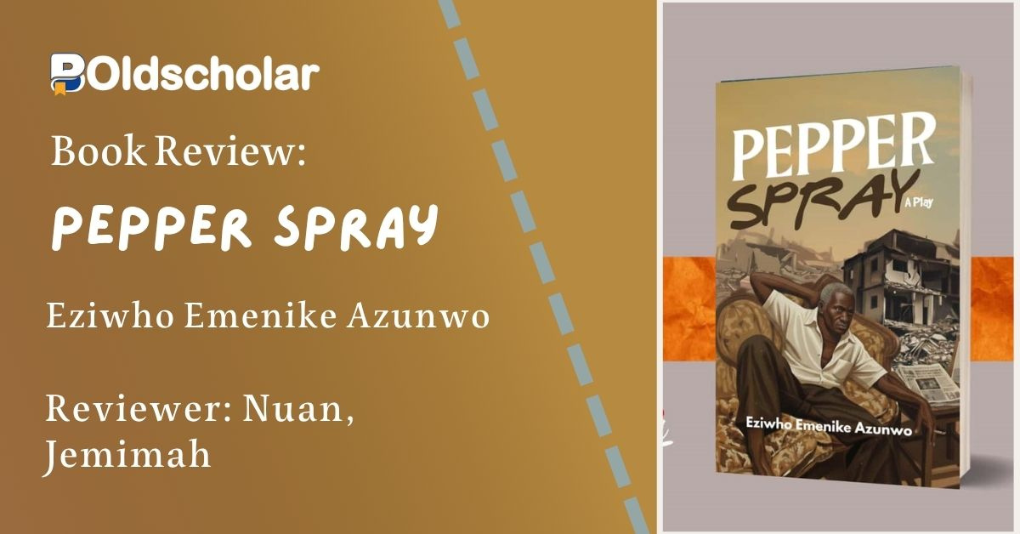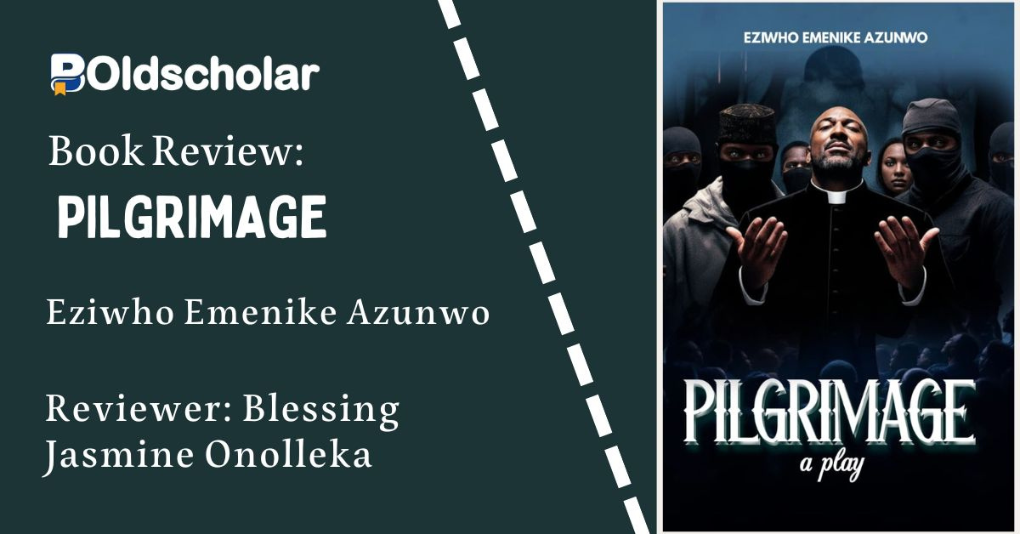Book: FREEDOM
Author: Ayodeji Gbenro
Reviewer: Dr. Usman Oladipo Akanbi
Publisher: Musty Graphics Prints
Year of Publication: 2022
Pages: 110
Introduction
In the month of July, 2022, when Ayodeji requested me to undertake this review, ‘Not again’ were the exact words that crept into my mind, as I was already saddled with yet another review, that of the book—You Again, written by Sr. Monica Aduzemare Obaro EHJ. To be honest, my first impulse was to decline the offer to review this book!
I resumed as a student of the university of Ilorin in 1987 and by 1990, I can say, with all sense of modesty, that I was perhaps the most active among students of the institution; as I was into all forms of activism on campus, such that I had a continuous stream of relationships, with so many older and much more experienced persons than my humble self, from within and outside of the university. Some were quite good to me while a motley few were anything but magnanimous; and in appreciation, therefore, of the luck that I met with those impressive ones, I had resolved that when I do grow much older in life, I will never hesitate to be like them, particularly, when dealing with the much younger generation to mine. So, I often find it difficult to refuse requests made to me by any dynamic and hardworking youth, like I have over time found Ayodeji to be; and even though, I received a copy of the book to be reviewed somewhat late (due to some communication gaps), I still felt obliged to undertake the review in the light of those fine attributes Ayodeji certainly possesses!
Here again, I will say I am a neophyte just like I did claim to be in my review of the book, You Again. Ordinarily, I am neither a sociologist, psychologist nor motivational speaker and what’s more, I do not belong to the laity in the Christian church which might have provided me with a better experience of analysing this motivational book heavily laced with Holy Scripture quotations. Regardless, I believe the author must have thoroughly considered these facts before saddling me with such an onerous assignment!
When I began my perusal of the book, I realized the opportunity I had to review the previous book in August would no doubt place me in a good stead to review this one too. The two authors definitely share some likenesses, the most striking of which is their desire to provide human beings with upliftment.
It would therefore not be out of place to bring in here some allusions that I made in that previous review done by me, where I stated, inter alia, “Not just a few in this world are struggling to live a life of fulfilment but unfortunately their efforts towards achieving this, most often, goes unrewarded. There are also a good number of persons that have been blessed with wealth but cannot lay claim to true happiness or fulfilment.
Attaining fulfilment in life is not by one's sheer ability but rather by His Grace, and this is essentially reflected when a particular need of ours is met by God at a critical point in time. The implication is that a true believer depends upon God for the supply of his or her needs, bearing in mind that God not only possesses all things but wields the infinite ability to grant our heart’s desires.
This author, while not straying from the aim of bringing spirituality into the achievement of lifelong goals, as enunciated in You Again, went on further to place greater emphasis on the individual becoming intentional, purposeful and goal driven in order to exert a greater degree of freedom later in life. After all, it is often said that whatever a man sows is what he will reap in due course, and that as one lays his bed, so shall he lie upon it.
The beautifully-written forward to the book by Dr. Oyeyemi Jumoke Jekayinfa, a Lecturer of Comparative Education in the Department of Arts Education, Faculty of Education, University of Ilorin, gives sufficient insight into what to expect from the book. And by the time you are through with this elegant piece, I can assure you, you will definitely agree with me that it is a product of some deep devotion, commitments with ‘labour of love’ that spurs the determination needed to make the world around the author a better place!
Organization
It's always reassuring to come across an inspirational book discussing human relationships in relation to scriptural allusions. Freedom is one didactic book which deftly combines biblical insights with practical ideas on how to develop and achieve the much-desired freedom—freedom from inordinate wants and oppression!
The book is segmented into five chapters and embedded within are principles that reflects an existential framework for achieving a meaningful life. In the first chapter, the author raises questions about what essentially makes life meaningful before he opines that most often, this question bears a personal tinge that determines the sort of answer it receives. In summary, he raises the following salient questions: to what extent can we allow others to determine our trajectory in life in the light of differing perceptions and interests? Could there be processes in place that can enhance the quest for personal freedom? How can an individual motivate themselves towards achieving set goals in life?
In chapter one, the author subsequently reflects on the doctrine that God has ordained all that will happen, especially with regard to the salvation of some and not others; this view has been particularly associated with the teachings of St Augustine of Hippo and of Calvin. However, the author still opined that we all have a role to play in forging our trajectory through life by being deliberate – while praying about it, and we must also consciously and strenuously work to keep our cosmos in a balance.
Maslow's Hierarchy of Needs is an idea in psychology proposed by the American Abraham Maslow in his 1943 paper “A Theory of Human Motivation” in the journal Psychological Review. The hierarchy of needs is used to study how humans intrinsically partake in behavioral motivation.
Maslow used the terms “physiological”, “safety”, “belonging and love”, “social needs” or “esteem”, “self-actualization” and “transcendence” to describe the pattern through which human needs and motivations generally move. In essence, this theory asserts that for motivation to arise at the next stage, each prior stage must be satisfied by an individual.
Now, I believe that the process of moving ourselves to the peak of this Maslow built-pyramid is a crucial aspect of this writer’s literary voyage. Certainly, before conquering the summit of the pyramid one must have to pass through the various vicissitudes of life and of course, that often-grueling process involved in moving from one step of success to the other, and this sums up the message the author is trying to pass in Freedom.
The author takes us on a literary rendezvous, detailing those risk factors that usually impedes the achievement of a fulfilled life viz-à-viz freedom. The key risk-factors that he identifies include poverty, insecurity, poor leadership—all within democratic and clerical contexts.
There are certain key indicators associated with economic development and these can be viewed from two perspectives. The first has to do with increasing levels of productivity (i.e., productivity per man and per hectare), and of course investment (i.e. increasing level of investment), while the second is: declining levels of poverty, unemployment and inequality. There are also other indicators that can be termed socio-political. These include mortality (i.e., infertility and life expectancy), rate of illiteracy, population and rate of growth and freedom from repressive codes, examples of which include freedom of speech, freedom to associate and of course, freedom from noise and pollution.
On page 8 of the book, while relating his views to these key indicators of economic development, the author makes us realize the devastation poverty can wreck on the life of an average man or woman when he says “I must inform you that poverty is deadlier than we think, and it has wreaked more havoc than just the socio-economic status of individuals. Poverty has restricted the capacity of many mentally. People who are meant to be potential frontliners in the face of the world's depression are hunting for survival in the woods. Do you think a hungry man will not first solve his hunger before proffering a solution to others?” (sic).
He thereafter discusses the effect of insecurity on not just a country but its debilitating effect on the psyche of the average citizen; and what’s more, he takes a swipe at the political and religious leadership whom he says has helped accentuate the misery of the common man and woman on the street. On political leadership, he paints an all-too-familiar picture: ‘Leadership in some parts of Africa has become atrocious so much that the followers' minds are now polluted towards seeking the seat of governance for personal interests.’ Pg 10.
Of the clergy, he notes: “Mischievous clerics amass followers through deception, by claiming to be servants of a Master who knows them not. Some even present themselves as higher than the One who truly saves. Pitiable followers who have digested wrong knowledge have blindly and foolishly been following the ravenous wolves and have been labouring to fill the stomachs of false prophets by thinking they are offering services to God.” Pg 12. This particular quote resonates with the biblical passage of Matthew 7: 21-23:
21 “Not everyone who says to me, ‘Lord, Lord,’ will enter the kingdom of heaven, but the one who does the will of my Father who is in heaven. 22 On that day many will say to me, ‘Lord, Lord, did we not prophesy in your name, and cast out demons in your name, and do many mighty works in your name?’ 23 And then will I declare to them, ‘I never knew you; depart from me, you workers of lawlessness.”
The author also makes us realise that followership within the political context falls into two categories, the first group that seems to be plagued with Stockholm syndrome and the other acerbic-tongued ones that take a recourse to cursing everything in sight – Nigeria yi’o le da mo proponents! In the same vein, he also likens the blind followers of clerics to persons with poor vision being exploited by sharp-eyed rogues! He therefore urges an unravelling of this paradoxical situation which tends to undermine the achievement of lifelong dreams of freedom. In his book, he makes worthwhile suggestions towards achieving positive changes within these stereotypical frameworks.
“My people perish for lack of knowledge.” Hosea 4:6
In chapter 2, titled The Assignment, the author takes us through his thoughts on the whole essence of our being on this planet which he nails down to the essentials of living a purposeful life. Purpose, the author says, “is a specific assignment you have been assigned to execute by God, from the day you realise it till your departure from the mortal realm.” He further emphasises that purpose “is not designed to be terminated by death. If you see a man whose work fades away with time because he is dead, it’s either such a fellow is still in process or out of purpose. The aim of purpose is to impact. So, men who are said to have fulfilled their purpose are people who outlived generations.” At this point, the author mentions Apostle Paul, Mary Slessor, Martin Luther King, Nelson Mandela and others as prime examples of those who met this expectation during their lifetimes.
He therefore enjoins the youths in particular to continue plodding on and not be deterred even in the face of glaring injustices that pervade the land. He sues for peace and resilience among youths, seeing it as a precursor for a new paradise to come – and like John Milton said in his epic Paradise Lost:
“Where peace and rest does not dwell,
hope never comes, that comes to all,
but torture without ends.”
The author further collaborates his position with scriptural provisions, emphasising the need to live impactful lives, such that when someone is no more, their works will continue speaking volumes for them. This exhortation by him no doubt reminds me of the poem, A Psalm of Life, written by the great Henry Wadsworth Longfellow:
What The Heart of The Young Man Said to The Psalmist
Tell me not, in mournful numbers,
Life is but an empty dream!
For the soul is dead that slumbers,
And things are not what they seem.
Life is real! Life is earnest!
And the grave is not its goal;
Dust thou art, to dust returnest,
Was not spoken of the soul.
Not enjoyment, and not sorrow,
Is our destined end or way;
But to act, that each to-morrow
Find us farther than to-day.
Art is long, and Time is fleeting,
And our hearts, though stout and brave,
Still, like muffled drums, are beating
Funeral marches to the grave.
In the world’s broad field of battle,
In the bivouac of Life,
Be not like dumb, driven cattle!
Be a hero in the strife!
Trust no Future, howe’er pleasant!
Let the dead Past bury its dead!
Act, — act in the living Present!
Heart within, and God o’erhead!
Lives of great men all remind us
We can make our lives sublime,
And, departing, leave behind us
Footprints on the sands of time;
Footprints, that perhaps another,
Sailing o’er life’s solemn main,
A forlorn and shipwrecked brother,
Seeing, shall take heart again.
Let us, then, be up and doing,
With a heart for any fate;
Still achieving, still pursuing,
Learn to labor and to wait.
Finally, in chapter 2, the author reflects on themes of justice, equity and righteousness. Usually what follows equity is fairness but, in this case, righteousness is what the writer hammers on, perhaps drawing some inspiration from the biblical quotation, “Righteousness exalts a nation, but sin is a reproach.” On this premise, the author enjoins all persons to shun corruption, greed, lustfulness and personal aggrandizement, and to rather uphold righteousness in all of its ramifications. Righteousness, he says, is “an all-encompassing element that assures freedom from the state of gall, sympathy, and empathy.” (sic). Pg 28.
“Jesus said to him, `No one who puts his hand to the plough and looks back is fit for the kingdom of God.ʼ” Luke 9:62
Chapter 3, which he titled “Dominion or Migrations,” discusses the merit or otherwise of taking decisions without any consideration for the will of the Almighty God. While predestination may appear to be such an important denominator in our being on this planet, it is apparent that we have some measured level of freewill to pursue whatever our heart desires.
Kant, a philosopher, argued that all humans have a sense of oughtness. It is illogical, he said, to have a sense of oughtness without being free to follow or reject that sense; but the religionists, on the other hand, believe that when it comes to the choice of eternal salvation, man has no option than to follow divine dictates. This is a belief which I can deduct from this book also. He further appears to share the view that God foreknows our choices but he does not necessarily cause it. In essence, we are ultimately the architects of our own fortunes! The author however subtly enjoins youths to think deeply and pray hard before making delicate life choices such as migration/relocation from one place/country to another. The pasture over there may not necessarily be greener, after all; he cited a few anecdotal instances to buttress his points in this direction.
This session of the book certainly reminds me of a Quranic admonition that my late father recited to me on several occasions: “Perhaps you dislike something which is good for you and like something which is bad for you. Allah knows and you do not know,” Quran 1:216.
In chapter four, titled “Engage in the Process”, the author reflects further on the necessity of living an intentional, purposeful and goal-driven life. The author goes on to give useful tips on successful living such as the need to eat healthy food, avoid gossip and negative friendships, whilst cultivating self-belief and other positive attitudes. He emphasized that by having complete faith in God and praying earnestly to him, we can surely overcome all obstacles ahead of us. He however asserts that this is, indeed, an engaging task which we must all strive to accomplish if we desire long-lasting freedom! This view he expresses here definitely resonates with the popular Christian hymn which goes thus:
When we walk with the Lord in the light of His Word
What a glory He sheds on our way!
While we do His good will, He abides with us still
And with all who will trust and obey
Trust and obey, for there's no other way
To be happy in Jesus, but to trust and obey
Not a shadow can rise, not a cloud in the skies
But His smile quickly drives it away
Not a doubt or a fear, not a sigh or a tear
Can abide while we trust and obey Oh,
Trust and obey, for there's no other way
To be happy in Jesus, but to trust and obey.
Paraphrasing another writer: we have to work out, by a process of experience and introspection, what counts as meaningful in our eyes. Whereas pleasure manifests itself immediately, our taste in meaning may be more elusive. We can be relatively far into our lives before we securely identify what lends them their meaning, but nonetheless, it is always better late than never. Certainly, this book is an eye opener for whosoever wishes to learn; in this chapter, the author in conclusion affirms that “with faith in the Almighty God, all things are possible!”
“And Jesus said unto them, Because of your unbelief: for verily I say unto you, if ye have faith as a grain of mustard seed, ye shall say unto this mountain, remove hence to yonder place; and it shall remove; and nothing shall be impossible unto you.” - Matthew 17:20 (KJV)
In the book's final chapter, the author continues with his exhortations by making suggestions on key attributes a would-be conqueror must possess, namely: such as resilience, sincerity, consistency, doggedness, and the willingness to take the lead and fight based on certain strong convictions (which may be reflected by personal, civil and/or spiritual considerations). He also emphasized that such convictions must be premised on a noble goal. In this respect, the author tries to differentiate between a terrorist and a freedom fighter in terms of the goals the two persons may be pursuing.
Taking a creative license in chapter five, he shortened the word freedom to some form of another word which he termed “dom.” According to him, recognizing one’s dom is paramount to the achievement of freedom. He stated further that a legacy of achievements which guarantees freedom in the long run, can only be driven by passion.
It is evident that the author is well-read as he periodically makes allusions from time to time to works of famous writers and motivational speakers like Benjamin Disraeli, John Maxwell, George Bernard Shaw, Francis Bacon, Marcus Garvey, Moshe Dayan—amongst others. I am not sure if the author is a fan of the football club, Arsenal, as he also quoted their most iconic coach, Arsene Wenger!
There was an ultimate addendum to the chapters which he titled ‘Letter to a Friend’. Here, the author concludes his treatise with entreaties to an imaginary friend, whom I suppose represents the youthful generation, urging on the need to hold-on strong and more importantly, uphold the firm belief that success awaits them at the end of the dark tunnel. O! what a friend we have in this author, who has granted us, through his latest book, a shoulder to lean on!
Conclusion
The first book that I ever reviewed was that of Mrs Raliat Ibrahim of the Nigerian Television Authority, Ilorin, the second being that of the Reverend Sister Monica A. Obaro EHJ, and I want to believe that my being called up to do these reviews weren’t borne out of the fact that I am a lecturer in the field of Agricultural Economics but rather because I am gradually, also, becoming recognized as a writer in the literary sphere!
I however noted that there is not enough empirical evidence to back up the various themes, principles and suggestions the author hammers upon in this book. I equally observed the boisterous flood of topics/themes in this book of just 110 pages, such that it could almost drown a neophyte reader into a state of confusion! The author also missed out a space for referencing the authors quoted by him in the text. In the subsequent edition of this book, therefore, the author needs to work on these identified areas, and also imperatively, factor in more local experiences rather than the foreign ones that appear to be more dominant.
We have the power to influence others with our words, and our message can surely inspire, motivate, persuade and touch the hearts of our readers before spurring them on to taking positively-directed courses of action. Fortunately, this book, which considered a range of options, for where meaning might lie for many people, was written in clear and excellent English by the author. The words within are simple, but the ideas expressed are profound and I, therefore, have no hesitation in recommending the book to you all. Do pick up a copy, read, chew and digest it. Then, don't hesitate to let the world know how greatly the book consequently influenced your words and actions. I can assure you; you will not only come back to appreciate me, but also, to thank the author of this beautiful book: Freedom!
Thank you for your kind attention.
References
- McLeod, Saul (29 December 2021) [2007]. "Maslow's Hierarchy of Needs". Simply Psychology. Retrieved 18th September 2022.
Share this post





Ayodeji Gbenro
I wanted to express my sincere gratitude for taking the time to review FREEDOM. Your insightful feedback and constructive comments have been immensely valuable in enhancing the quality of my work. Your expertise and attention to detail have not only contributed to the refinement of this book but also provided valuable insights for future improvements. I truly appreciate your dedication to ensuring excellence in my endeavors. Thank you once again for your commitment and thoughtful input. Your support is instrumental, and I look forward to the opportunity to collaborate with you on future projects.